Chill Lab celebrates first year anniversary with successful programs to boost help-seeking behaviour among students
82% of secondary students stated that they would seek help during emotional distress after joining the programs, 30% increase compared to pre-program statistics
- In the first year of the program, Chill Lab reached 94 schools by organizing a series of school activities, workshops and campaign activations, positively transformed or impacted a total number of 36,533 lives, which exceeded original impact targets.
- Of the total surveyed participants, 98% reported a remarkable improvement on mental health literacy, signaling heightened awareness, reduced stigma, and increased willingness to seek help.
- 93% reflected that they would most likely seek emotional support from their peers, as indicated by the questionnaire completed by over 3,000 students.
- Female students initially showed more difficulties in managing emotions compared to their male counterparts, but the Youth Hub led to a substantial improvement in this area.
- The program integrates youth mental wellbeing strategies into the education system, aligning with the "4Rs Mental Health Charter". The program also involves youth and community stakeholders in the development of related policies.
Last year, Zurich Insurance (Hong Kong) ("Zurich Hong Kong") collaborated with Z Zurich Foundation and The Mental Health Association of Hong Kong (“MHAHK”) to launch Chill Lab, a three-year youth mental wellbeing prevention and promotion program that aims to drive systemic change in Hong Kong’s approach to youth mental wellbeing.
Over the past year, we implemented a series of multi-channel initiatives, including 67 VR/AR and Human Library sessions in our Youth Hub, 92 school-based activities, 21 community campaigns and the development of a bilingual mental health education kit to raise awareness and understanding of mental wellbeing, reduce stigma and promote inclusion. We are proud to announce that 36,553 lives were positively transformed or impacted following these initiatives, exceeding the planned target for the first year. For further program details, please refer to Appendix 1.
The program’s system-level ambition is to integrate youth mental wellbeing strategies into the educational framework, in close collaboration with the Education Bureau and other key stakeholders. These advocacy efforts emphasize the importance of embedding mental health promotion into school curricula, ensuring that these programs are not just standalone initiatives, but an integral part of students' educational experiences. Through engagement with policymakers, including Legislative Councilors, District Councilors and the Educational Bureau, MHAHK has successfully aligned the program’s initiatives with the principles outlined in "4Rs Mental Health Charter". This demonstrates our joint commitment to driving systemic change. Moreover, the program actively involves youth representatives and community organizations in the development of relevant policies and programs to launch comprehensive prevention services and community outreach initiatives. By integrating mental health support into the education system and involving diverse stakeholders, we aim to cultivate supportive environments for students and encourage peer-led mental well-being initiatives.
The program employed a comprehensive impact measurement methodology to assess the effectiveness of its inaugural year, utilizing pre and post questionnaires completed by nearly 6,500 participants. This methodology incorporated four distinct sets of questionnaires specifically designed to evaluate changes in youth mental health-related attitudes and behaviors across various program components, including the Youth Hub Experience Center, school-based services, creative workshops, and community prevention campaigns. Out of 6,500 respondents, approximately 1,900 resulted from Youth Hub Experience Center, 3,000 from school-based services, 300 from creative workshops, and 1,300 from community prevention campaigns. This rigorous evaluation framework not only quantifies the project's impact but also provides essential insights to guide future program enhancements and strategic initiatives.
Enhanced mental health literacy on both personal and community levels, pursuing a more inclusive, open-minded community
98% of the program’s participants feedbacked that their mental health literacy has been improved after school-based activities according to a survey filled by 3,000 participants. The improvement implied a higher awareness of their mental health conditions, reduced stigma on mental health challenges, and an increased willingness to seek help whenever needed.
On a personal level, participants exhibited heightened awareness of their mental wellbeing and an enhanced capacity to manage emotional changes. They demonstrated improved attitudes and behaviors to identify and access available resources, take action for themselves and their community, as well as resorting to effective strategies for seeking assistance when facing emotional setbacks.
Compared to traditional one-way seminars or workshops, 90% of participants reported that the Youth Hub sessions were engaging and interactive, which elevated their interest in further understanding the topic. Furthermore, the survey findings indicated that the Human Library session was particularly impactful, as it allowed participants to engage in direct dialogue with individuals who had personal experiences navigating mental health challenges. This interactive format enabled students to develop a deeper understanding of the feelings and daily lives of those coped with mental health disorders, fostering greater empathy and raising their ability to identify symptoms of common mental health issues, which is an important step towards taking action for themselves and peers.
On a broader community level, the program equipped participating students with the skills and knowledge to better manage stress and anxiety. Importantly, these students also demonstrated heightened empathy and an enhanced capacity to provide meaningful support to their peers navigating similar issues. The program's success in elevating mental health literacy has catalyzed a shift towards a more inclusive, informed, and empathetic community approach to decreasing stigma, promoting a healthier, more constructive dialogue surrounding mental wellbeing within the broader population.
Gregory Renand, Head of the Z Zurich Foundation, added, “We believe that enhancing mental health literacy on both personal and community levels is crucial. By pursuing a more inclusive and open-minded approach, we can create an environment that destigmatizes mental health challenges and empowers individuals to prioritize their emotional wellbeing. We are pleased to see that students are equipped with the knowledge and skills to support one another, while also fostering a community that is compassionate and understanding towards mental health through the initiatives of Chill Lab. Our holistic efforts to improve mental health literacy will pave the way for a future where seeking help is normalized and people feel empowered to take full care of their own mental wellbeing.”
Notable increase in participants' willingness to seek help for mental health concerns, greatly driven by the innovative use of AR/VR and Human Library session in Youth Hub
The Youth Hub initiatives have been instrumental in driving a significant increase in participants' willingness to speak up about their emotions and seek help for mental health concerns. Compared to pre-program statistics, the number of students stating they would actively seek assistance during emotional distress rose by an impressive nearly 30%. According to pre-program surveys, 65% indicated they would seek help from others during emotional distress, while after the intervention, the proportion substantially increased to 82% in the post-program surveys. The survey’s findings also underscored the profound impact of our innovative and dialogue-focused approach, with 90% of students agreeing that the Youth Hub activities were compelling and sparked their interest in further exploring mental health topics. This remarkable shift in mindset and help-seeking behavior could be directly attributed to the Youth Hub's innovative and interactive format.
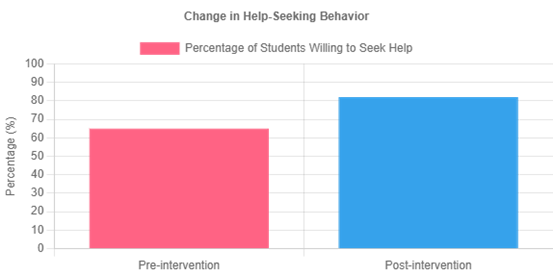
Data Source: Impact measurement of Chill Lab, MHAHK 2023/24
The Youth Hub offers an engaging, interactive alternative for students to understand mental wellbeing building on their own emotions. AR games and VR immersive experience with de-briefing sessions, Human Library and open discussion were effective means to cultivate a trustworthy and supportive environment. These innovative experiences empowered participants to build greater empathy, express their feelings and experiences, and ultimately diminish the stigma surrounding mental health challenges. As a result, students became increasingly receptive to proactively addressing their own wellbeing when necessary.
Eric Hui, Chief Executive Officer of Zurich Insurance (Hong Kong), stated, “We are thrilled to see the impact of our Youth Hub programs reflected in the data. 82% of students now express their willingness to seek help for their mental health needs, which represents around a 30% growth compared to the pre-program statistics. This demonstrates the power of our initiatives and the importance of creating safe, supportive spaces for young people to prioritize their emotional wellbeing. By destigmatizing mental health challenges and encouraging help-seeking behavior, we are laying the foundation for a future where mental health is treated with the same care and attention as physical health. This is a testament to the dedication and hard work of our team, as well as the resilience and openness of the young people we serve.”
Heavier influence of peer relationships in coping with emotional challenges
As mentioned above, we are happy to see a more positive mindset shift of students towards help-seeking behavior when they are facing emotional challenges. It was also found that 93% of students are most likely to seek emotional support from their peers. This finding highlighted a significant trend in adolescent social dynamics and emotional coping strategies. Adolescents often experience emotional turmoil during this stage of life as they navigate physical, cognitive, and social changes. They may feel overwhelmed by the various demands from school, family, and social expectations, leading to feelings of anxiety, depression, and low self-esteem. In this context, peer relationships can provide a sense of belonging, validation, and emotional support.
Stephen Wong, Assistant Director (Service), MHAHK, said, “Adolescents who have strong peer relationships are more likely to receive emotional support, such as empathy, encouragement and advice, which can help them cope with stressors and build resilience. This behavior suggests that peer relationships play a vital role across different stages of adolescence. Given the high reliance on peer support, schools could benefit from implementing youth-led mental health programs, which is one of the key interventions of Chill Lab, to maximize peer influence. These programs could train students to provide effective, empathetic support, ensuring healthy and constructive advice.”
Despite the preference for peer support, it is crucial to also foster meaningful connections between students and adults, such as teachers, counselors, or parents, who can provide necessary guidance, spark conversations and oversight to ensure students' emotional wellbeing. Building on the successful initial step of raising mental health awareness among students, the program can now enhance its impact by promoting positive behavioral changes, specifically encouraging students to seek professional help when needed.
Additionally, integrating mental health education into the school curriculum, conducting workshops for students, teachers, and parents, and establishing partnerships with mental health professionals will normalize and facilitate access to professional care. To support these initiatives, digital and social media platforms are utilized to connect students directly with mental health resources, ensuring a comprehensive, accessible, and supportive environment that balances peer influence with professional guidance.
Female students initially showed more difficulties in managing emotions compared to their male counterparts, but the Youth Hub led to a substantial improvement in this area
Among the secondary school students who participated in the Youth Hub activities, pre-program survey revealed significant gender disparities in emotion management. 30% of surveyed female students and 16% of surveyed male students reported difficulties in controlling their emotions and reactions when encountering unpleasant experiences.
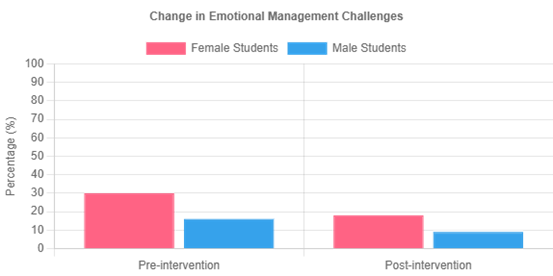
Data Source: Impact measurement of Chill Lab, MHAHK 2023/24
It is suggested that adolescence is a critical period of emotional development, where girls tend to experience more ups and downs compared to boys. Girls are also more likely to struggle with anxiety, depression, and engage in coping mechanisms like self-harm. This may be partially attributed to differences in how boys and girls express and acknowledge their emotions (Whitlock, 2019)1.
However, the Youth Hub intervention led to substantial improvements in emotion control across both genders. Following the program, the proportion of students reporting difficulties dropped to 18% for females and 9% for males - a notably greater percentage decrease for female participants.
This drop highlighted the Youth Hub’s success in enhancing emotional resilience and anxiety management, particularly the female student group that initially struggled the most. In response to these observations, the capacity-building program was further enriched to include tailored mental health training that addressed the diverse learning styles and emotional needs of both female and male students. This comprehensive approach aimed to deepen the understanding of gender-specific mental wellness requirements among schools, caregivers, and the students themselves.
For further details on the survey findings, please refer to Appendix 2.
Conclusion
The Chill Lab program is at the forefront of revolutionizing adolescent mental health support. By arranging experience sessions in Youth Hub, hosting activities in schools, conducting workshops in the local community and strengthening collaborations with mental health professionals, the program has seen remarkable achievements in positively impacting or transforming lives over the past year. These efforts have facilitated easier access to necessary support and resources for students.
These impactful findings underscore Chill Lab's steadfast commitment to nurturing a generation of mentally resilient and empowered youth. Through youth-led initiatives that promote empathetic support and mental wellbeing, the program continues to lead the charge in transforming the landscape of youth mental health in Hong Kong. With forward-looking plans, Chill Lab is confident in making an even greater difference in the lives of students. By empowering them to prioritize their wellbeing, we aim to cultivate a better future with more care and focus on mental health.
Chill Lab Contact:
- Address: 4/F, Sai Tso Wan Neighbourhood Community Centre, 81 Cha Kwo Ling Road, Kwun Tong, Kowloon
- Tel: +852 2834 9618/ +852 6114 4738
- Email: chilllab@mhahk.org.hk
- Website: https://www.chilllab.org.hk/
- Instagram: https://www.instagram.com/chilllab.org.hk/
- Facebook: https://www.facebook.com/ChillLabHK
1 Whitlock, J. L. (2019). The intersection of gender and emotional regulation in adolescence. Journal of Youth and Adolescence, 48(10), 1879-1892.
Appendix 1 – Intervention details
| Intervention | Program details |
|---|---|
| 1. Youth Hub | Experiential activities |
| 2. School-based Program | In-class workshops, lunch programs, exhibition, movie watching, roadshows |
| 3. Creative Program | Expressive Arts Workshop |
| 4. Pioneer Program | Teens mental health first aid training, youth led school and community based mental health promotion activities |
| 5. Community Program | Educational booth, roadshows, movie watching, seminars |
| 6. Capacity Building | Training on Mental Health Course for Secondary School Students |
| 7. Prevention Campaign | Social media campaigns, website article development |
Appendix 2 – Summary of Key Survey Findings
Number of Respondents
| Source of Survey | Total number of respondents |
|---|---|
| Youth Hub Experience Center | 1,900 |
| School-based services | 3,000 |
| Creative workshops | 300 |
| Community Prevention campaigns | 1,300 |
Survey Findings
Impact Measurement of Chill Lab, MHAHK 2023/24
Key Survey Results
| Pre-program | Post-program | |
|---|---|---|
| 1. My knowledge of mental well-being has been enhanced. | N/A | 98% |
| 2. My awareness of mental well-being has been increased. | N/A | 98% |
| 3. My willingness to take care of my mental well-being has been improved. | N/A | 98% |
| 4. My acceptance towards mental illness has been improved. | N/A | 99% |
|
5. When I have unpleasant emotions, I will find someone (who can help me), |
65% | 82% |
| 6. When encountering unpleasant experiences, I cannot control my emotion and avoid from making impulsive reactions (Youth Hub Experience Center) |
30% Female 16% Male |
18% Female 9% Male |
| 7. I will recommend this hub to others. (Youth Hub Experience Center) |
N/A | 85% |
| 8. Persons who I would seek help from (School Based Activities) |
N/A | 93% from Peers |
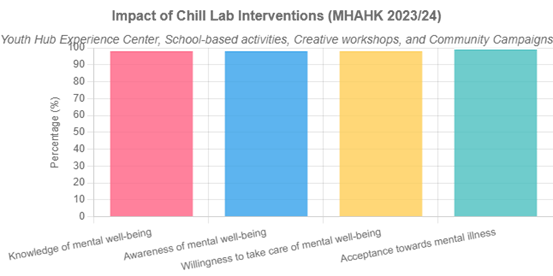
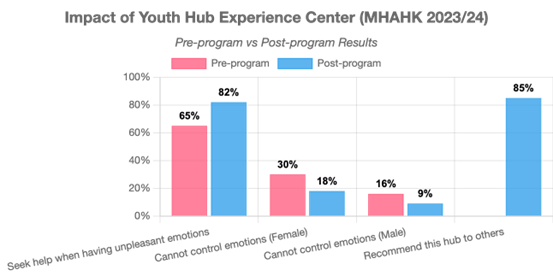
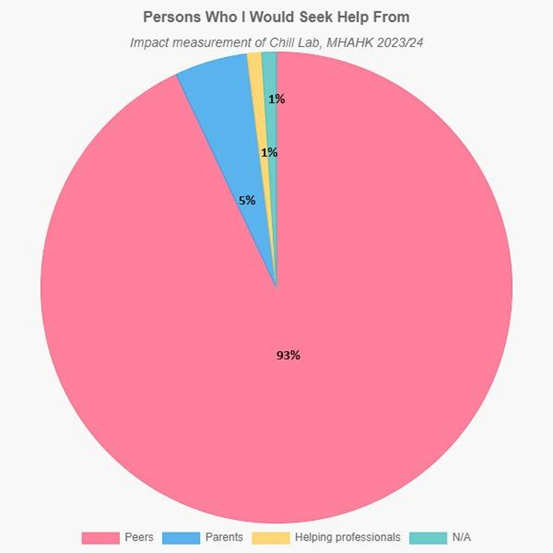
Appendix 3 – Pictures for publication use

Tulsi Naidu, CEO Asia Pacific, Zurich Insurance (right three), Eric Hui, CEO, Zurich Insurance (Hong Kong) (left four), and Sofyen Khalfaoui, Head of Improving Mental Wellbeing, Z Zurich Foundation (right two), visited the Chill Lab’s youth hub with and Stephen Wong, Assistant Director (Service), MHAHK (left three).

Zurich Hong Kong’s volunteers attended AR & VR experience session together, supporting the youth mental health development.
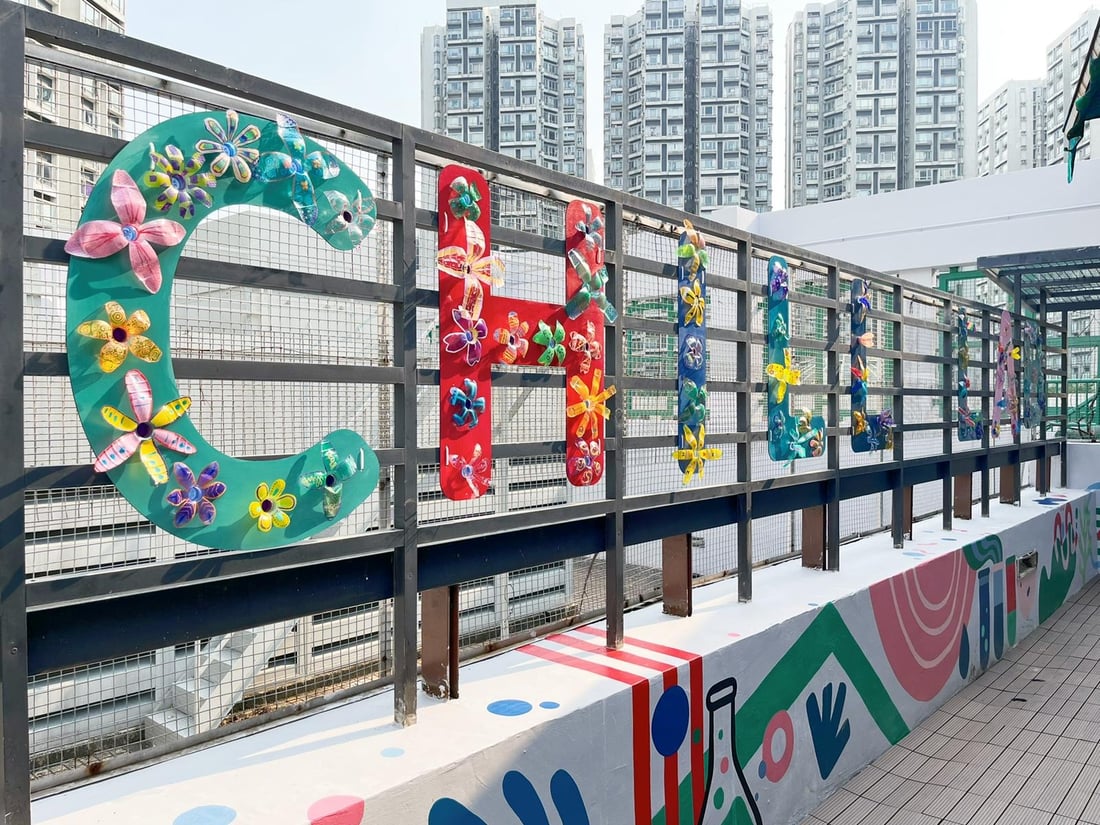
Zurich Hong Kong’s volunteers created eco-friendly crafts with recycling plastic bottles and decorated the youth hub’s balcony.